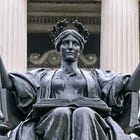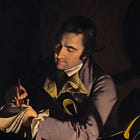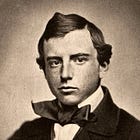Does History Belong in Universities?
A reflection on the history of the academic study of past events
The historian works alone. When he collects his materials, whether by shuffling dusty documents, consulting half-forgotten books, or perusing shelf-worn collections of old magazines, he does so in halls of silence. (Indeed, the tendency of archives to automate the ordering and delivery of documents often deprives the researcher of the few seconds of human interaction he might otherwise have enjoyed in the course of a working day.) When he writes, he plays the role of a latter-day Silas Marner, weaving the warp of his words through the weft of his argument, with nought to keep him company but a Keurig machine and a colicky cat called Childeric.1
The learning of Clio’s craft bears a close resemblance to its practice. Indeed, the chief difference between a historian’s apprenticeship and the full-bosomed conduct of his business lies in the role played by models. Consciously or not, the tyro copies much from the approaches taken, the terms-of-art employed, and the sources used in the books he reads. (Such derivation continues until, one fine day, the apprentice discovers that the products of his toil are truly original, and not just in the “not-the-thesis-of-Claudine Gay” sense of that word.)
With this in mind, I recently found myself wondering how history found its way into English-speaking universities. This question, as wonderment often does, led me to the website of the Hathi Trust, where I ran a time-constrained (1800 to 1900) search on the terms “history” and “universities.” Among the first works to emerge from this query, I found some of the writings of Herbert Baxter Adams (1850-1901.) (If I am not too badly mistaken, Professor Adams rates a place of particular honor in the pantheon of the original gangsters of the study of history in American colleges and universities.)
Marvelous to say, the methods practiced by Adams, whether at Johns Hopkins University, where he spent most of his career, or Smith College, where he served as visiting professor, did much to prepare students for both the solitude and the self-direction of the life of an author of historical accounts. To begin with, each wrote substantial papers on topics of his (or her) own choosing. Moreover, when preparing for group discussions, students engaged in what might be called “free reading” (or, if you will allow me to coin a phrase in a language not mine own, lecture à choix.) That is, rather than poring over the same textbook as his (or her) classmates, each student selected suitable readings from a library that Adams had helped them to assemble.
In the course of fostering these exercises in independent (if not entirely self-directed) learning, Adams ran into two difficulties. First, participants in seminars sometimes hoarded books, making it difficult for their classmates (and, at times, Adams himself) prepare for discussions. Second, in the course of writing their papers, some students placed too much emphasis on the literary quality of their essays, thereby neglecting the critique of sources.
Adams solved the first problem by limiting the ability of students to take books out of the suite that housed the library, the seminar table, and the offices where Adams and his colleagues worked. As might be imagined, this converted the rooms into the late Victorian equivalent of a co-working space, We Work, if you will, avant la lettre.
To deal with the second problem, Adams rewarded students who devoted the lion’s share of their efforts to the forensic aspects of the historical inquiry, even if this reduced the readability of the product of their labors. Likewise, he penalized those who, like so many well-read historians of his day, borrowed too much from Arthur Conan Doyle and too little from the latter’s most famous character.
Adams devoted much of his relatively short life (he died in his fifty-first year) to the promotion of the formal study of history in American universities, colleges, and high schools. As a result, he wrote nothing comparable to the majestic works of such contemporaries of as (the entirely self-taught and completely self-directed) Francis Parkman. Indeed, apart from Maryland's Influence upon Land Cessions to the United States (which, though hardly a page-turner, proved far more interesting than the title would suggest), most of what Adams wrote with respect to the past consisted of accounts of the rise of American colleges and, in particular, the study of history therein.
My acquaintance with Herbert Baxter Adams taught me two things. The first was the degree to which early attempts at the teaching of history as an academic subject asked students to replicate, if only in miniature, the way that working historians actually work. The second was the deep roots of the navel gazing so much in evidence among academic historians, and, in particular, the degree to which present-day professors prefer talk of the comings, goings, and doings of colleagues, and the rise and fall of history departments, to discussion of the great events, institutions, and ideas of the past.
Sources:
Herbert Baxter Adams Methods of Historical Study (Baltimore: N. Murray, 1884)
Herbert Baxter Adams Maryland's Influence upon Land Cessions to the United States (Baltimore: N. Murray, 1885)
Herbert Baxter Adams The Study of History in American Colleges and Universities (Washington: Government Printing Office, 1887)
For Further Reading:
Please forgive, Gentle Reader, the solipsism of the affiliated sentence. I promise that, in paragraphs to come, I will keep that inclination in check, lest this critique descend into autobiography.








That's an interesting way of solving the self-direction problem, sacrificing writing for accuracy. The quality of the writing vs the quality of the research is hard for me to separate, since history is still stories. The worst historians are boring storytellers or flagrant liars. So there's a balance between telling a good story and accuracy.
Yes, it does. I have benefitted from being able to study and write it in many ways.